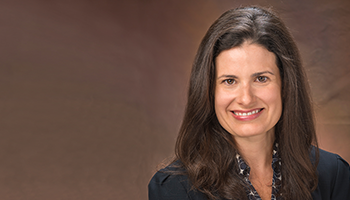HOW CAN WE HELP YOU? Call 1-800-TRY-CHOP
In This Section
Researchers Study How To Enhance Self-management of Survivors of Childhood Cancer
Adolescents and young adults with a history of cancer may seem prepared to handle anything that comes their way and want to move on with their lives. Unfortunately, too often what gets left behind is cancer survivors’ commitment to engaging in long-term follow-up care. As their recommended annual appointment rolls around, they may not be motivated to take it seriously when they’re asymptomatic and feeling fine.
“We know from data at our site and the large epidemiological data from the Child Cancer Survivor Study that their health behaviors may be on par with the average adolescent and young adult, and sometimes they may be worse,” said Lisa Schwartz, PhD, an attending psychologist in the Division of Oncology and the psychologist for the Childhood Cancer Survivorship Program at CHOP, and an assistant professor of clinical psychology at the Perelman School of Medicine at the University of Pennsylvania. “Their engagement in appropriate long-term follow-up care decreases, especially as they get lost in that divide between the transition to pediatric and adult care.”
At this precarious pivot point in cancer survivorship, adolescent and young adults’ (AYA) conscientiousness for self-management and maintaining healthy behaviors may be lacking at a time when parents may play less of a role in managing their child’s health; meanwhile, risks for developing chronic or life-threatening late effects from cancer treatment often emerge during young adulthood.
Yes, they’re cured of cancer, but they may have or be at risk for many health vulnerabilities such as cardiac or pulmonary disease; endocrine problems including short stature, diabetes, and infertility; and greater susceptibility to other cancers. The level of risk for these “late effects” may depend on such things as age of diagnosis, the type and dosage of chemotherapy they received, and the site and dosage of radiation. Long-time survivors of childhood cancer usually are recommended to have annual lifelong follow-up care by a knowledgeable provider who understands how to monitor for these late effects and recurrent or new cancer, and how to provide applicable education and care plans.
Dr. Schwartz, who also is a core faculty member at Clinical Futures, a CHOP Research Institute Center of Emphasis, and the co-director and co-founder of CHOP’s mHealth Research Affinity Group, is leading a five-year study of 600 adolescent and young adult long-term survivors across three different sites to better understand predictors and patterns of their self-management and identify what skills are related to transition readiness. The study’s findings also could inform best practices to design future interventions to enhance cancer survivors’ well-being and appropriate healthcare utilization throughout their lifetime.
With the support of a new grant from the National Institute of Nursing Research, this work will take advantage of a decade of Dr. Schwartz’s research to rigorously evaluate a Social-ecological Model of AYA Readiness to Transition (SMART) and validate a companion measure called the Transition Readiness Inventory (TRI).
“It is really exciting to see that program of research continue to build over the years with bigger samples and more sophisticated methods,” Dr. Schwartz said. “Our rigorous methods and the variables that we’re assessing are looking at a distinct population of AYA survivors, but this type of research is needed for all pediatric diseases to really understand how they’re engaging in disease self-management across the transition to adulthood.”
Study participants will enroll from CHOP, Cincinnati Children’s Hospital Medical Center, and Children’s Hospital Los Angeles. Purposefully, each site represents a different model of how they handle the transition to adult-oriented care. The study team will assess healthcare utilization, transition readiness, and self-management skills and track how those trajectories change over time by collecting a large amount of self-report measures, including TRI, at the start of the study, at 12 months, and then at 24 months. Electronic health care records of healthcare utilization will also be reviewed. If in that time a study participant transfers to an adult provider, then the study team we will collect other measures from them related to their experience of that transfer process.
“Ultimately, this study could inform a more tailored approach to intervention to keep AYA survivors at risk for poor self-management and disengagement more motivated and engaged,” Dr. Schwartz said. “They survived cancer. We want to protect that investment and have them live long healthy adult lives.”
 By
By